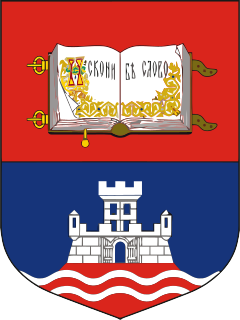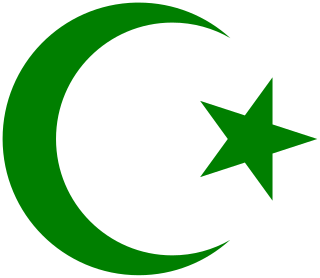Secularism, as defined in the Merriam-Webster dictionary, is the "indifference to, or rejection or exclusion of, religion and religious considerations". In certain context, the word can refer to anticlericalism, atheism, desire to exclude religion from social activities or civic affairs, banishment of religious symbols from the public sphere, state neutrality toward religion, the separation of religion from state, or disestablishment.
Islamic studies refers to the study of Islam. Islamic studies can be seen under at least two perspectives:

Religious studies, also known as the study of religion, is an academic field devoted to research into religious beliefs, behaviors, and institutions. It describes, compares, interprets, and explains religion, emphasizing systematic, historically based, and cross-cultural perspectives.
Vjekoslav Perica is a Croatian historian, journalist and writer who specializes in the modern history of religions in the former Yugoslavia.

Middle Eastern studies is a name given to a number of academic programs associated with the study of the history, culture, politics, economies, and geography of the Middle East, an area that is generally interpreted to cover a range of nations including Israel, Lebanon, Palestine, Jordan, Egypt, Iraq, Iran, Turkey, Syria, Saudi Arabia, Yemen, and Oman. It is considered a form of area studies, taking an overtly interdisciplinary approach to the study of a region. In this sense Middle Eastern Studies is a far broader and less traditional field than classical Islamic Studies.
Vladeta Jerotić was a Serbian psychiatrist, psychotherapist, philosopher and writer.
Dušan T. Bataković was a Serbian historian and diplomat. His specialty was modern and contemporary Serbian and Balkan history. The last post he held was that of Director of the Institute for Balkan Studies at the Serbian Academy of Sciences and Arts.
The International Journal of Conflict and Violence (IJCV) is an open access interdisciplinary scientific journal covering conflict- and violence-research. It has been published twice a year in English since 2007 and encompasses contributions from a wide range of disciplines including sociology, political science, education, social psychology, criminology, ethnology, history, political philosophy, urban studies, economics, and the study of religions.

The Sanjak of Prizren was one of the sanjaks in the Ottoman Empire with Prizren as its administrative centre. It was founded immediately after Ottoman Empire captured Prizren from Serbian Despotate in 1455. The rest of the territory of Serbian Despotate was conquered after the fall of Smederevo in 1459, and divided into following sanjaks: Sanjak of Vučitrn, Sanjak of Kruševac and Sanjak of Smederevo. At the beginning of the First Balkan War in 1912, the territory of Sanjak of Prizren was occupied by the armies of Kingdom of Serbia and Kingdom of Montenegro. Based on Treaty of London signed on May 30, 1913, the territory of Sanjak of Prizren was divided between Serbia and Montenegro.

Zorica Mršević is a Serbian professor, jurist, researcher and human rights activist. She works in the field of human rights and feminism, at local and international levels.
Irina Andreyevna Papkova, is a scholar of religion and international relations, currently a Research Fellow of Georgetown University's Berkley Center for Religion, Peace, and World Affairs. She is based in Washington, DC and New York.
Dr. Bora Kuzmanovic is a Professor of Social Psychology at Belgrade University. He was also a Member of Serbian Parliament (MP) twice as well as a Member of Parliament of The Federal Republic of Yugoslavia (MP) and later Parliament of Serbia and Montengero for social-democratic parties. During the war in former Yugoslavia Kuzmanovic was an opponent to Slobodan Milosevic. In 1993 Kuzmanovic was a spokesman for the leading opposition party in Serbia The Democratic Party. Psychological Association of Serbia assigned to prof. Dr. Bora Kuzmanovic The Award for Lifetime Achievement in 2014.
Radovan Samardžić was a Yugoslav and Serbian historian, member of the Serbian Academy of Sciences and Arts (SANU).

Abdullah Saeed is an Australian academic and scholar of Islamic studies who is currently the Sultan of Oman Professor of Arab and Islamic Studies at the University of Melbourne. He is particularly known for his progressive views on religious freedom in Islam and has been translated into several languages.
Talip Küçükcan is a Turkish professor of sociology and a former politician from the Justice and Development Party (AKP), who has served as a Member of Parliament for Adana since 7 June 2015 until 24 June 2018. He was head of the Turkish Delegation to and the Deputy Presiddent of the Parliamentary Assembly of Council of Europe and member of Foreign Relations Committee at the Turkish Parliament between 2015 and 2017. Küçükcan served as the deputy chairman of Political and Legal Affairs of the Justice and Development Party until July 2016. He also served as member of the OSCE PA of the Turkish delegation.

Rexhep Krasniqi (1906–1999) was an Albanian-American historian, teacher, nationalist, and anti-communist politician and activist. A Kosovar Albanian, he is remembered for his role in the Second League of Prizren, and long time leadership of the "Free Albania" National Committee.
Slobodan Vladušić is a Serbian writer and associate professor of Serbian literature at the Philosophical Faculty of the University of Novi Sad.
Ivana Hadži-Popović is a Serbian writer and translator.
Petar Pijanović is a Serbian writer and professor at the Faculty of Teacher Education of the University of Belgrade.













